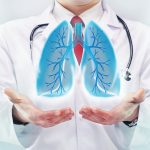“A diagnosis of ILD is a real blow to patients and families. What they want and need is information about the disease, its treatment and expected course,” Dr. Collard said. “Once they are past the shock of the initial diagnosis, they want information about how to live with the disease.”
A palliative care approach can be helpful from the point of diagnosis, with an evaluation for hospice eligibility when the disease becomes less manageable. Palliative care offers a range of support with symptoms, fears, financial burdens and spiritual or existential distress.
Lung transplant is the ultimate treatment for severe incurable lung disease, said Jeffrey Golden, MD, associate medical director of the Lung Transplantation Program at UCSF. The number of lung transplants performed annually worldwide is now up to 4,000, and more than half of them have been for CTD-ILD patients, he said. “You want people on the lung allocation list who have the best chance to get a transplant, but who aren’t so sick that it’s futile. If you have somebody with a diagnosis of ILD who could be a candidate, they should contact a transplant program for an informational evaluation session.”
Larry Beresford is a freelance medical journalist in Oakland, Calif.
References
- Fischer A, Antoniou KM, Brown KK, et al. for the ERS/ATS Task Force on Undifferentiated Forms of CTD-ILD. An official European Respiratory Society/American Thoracic Society research statement: Interstitial pneumonia with autoimmune features. Eur Respir J. 2015 Oct;46(4):976–987.
- Hagmeyer L, Theegarten D, Wohlschläger J, et al. The role of transbronchial cryobiopsy and surgical lung biopsy in the diagnostic algorithm of interstitial lung disease. C Clin Respir J. 2016 Sep;10(5):589–595.


